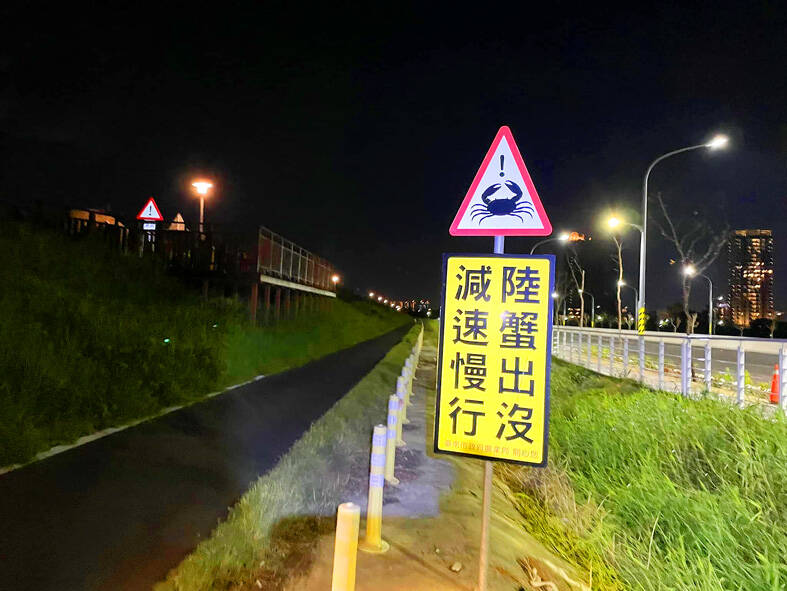Police are taking steps to prevent the poaching of land crabs in Tainan’s Taijiang National Park to ensure that the crustaceans can reproduce, the National Police Agency (NPA) said on Friday.
The NPA’s Seventh Special Corps said in a statement that it would initiate patrols at the park as the breeding season for Cardisoma carnifex, the largest land crab species in Taiwan, is from July to August every year.
During the two months, female land crabs carry their eggs from the windbreak near Chengsi Menghuan Pond (城西夢幻湖) to the beach after sunset to lay them in the water, the Seventh Special Corps said, adding that it is a potentially lethal route as they could get run over by vehicles or caught by people and cooked.

Photo courtesy of a reader
It said it would control traffic on the road on Cingcaolun Bank (青草崙堤防) to keep the land crabs safe at night.
People who catch and hunt land crabs in national parks face a fine of up to NT$1,000 for contravening the National Park Act (國家公園法), and can be detained or sentenced to up to one year in prison for if they cause serious damage, Seventh Special Corps said.
In related news, two local land crab protection volunteers wrote on social media earlier this week that they were dismayed at some people’s lack of understanding with regards to ecological conservation.
Chuang Chih-hsun (莊智巽) wrote on Facebook that he and his brother Chuang Chih-shan (莊智善) were on their way back from a stint watching over the land crabs on Tuesday when they bumped into two migrant workers with a bag of more than 100 land crabs they had caught to share with their friends.
The brothers were watching over land crabs outside the park along the Yanshui River (鹽水溪), as the crabs are not legally protected there, as they are inside the park.
Chuang Chih-hsun said that it was a hard sight to see, as he and his brother have been devoted to protecting land crabs for more than a decade under their parents’ guidance.
“While we were saving crabs that might have been killed by cars, you made a beeline for the estuary where they laid their eggs. While we saved 10-plus crabs, you caught more than 100 to eat,” he wrote.
Despite their frustration, the Chuang brothers said they would continue their work.
The local agriculture bureau said that it can only try to persuade people that it is unethical to catch land crabs if they are caught outside a national park, because the crabs are not a protected species.

The Chinese military has built landing bridge ships designed to expand its amphibious options for a potential assault on Taiwan, but their combat effectiveness is limited due to their high vulnerability, a defense expert said in an analysis published on Monday. Shen Ming-shih (沈明室), a research fellow at the Institute for National Defense and Security Research, said that the deployment of such vessels as part of the Chinese People’s Liberation Army (PLA) Navy’s East Sea Fleet signals a strong focus on Taiwan. However, the ships are highly vulnerable to precision strikes, which means they could be destroyed before they achieve their intended

The Taiwan Experience Education Program (TEEP) has funded short-term internships in Taiwan for more than 4,500 young people from more than 40 countries since 2015, with the goal of attracting and retaining international talent, the Ministry of Education said yesterday. Fifty-five colleges launched 514 projects this year, including in fields such as semiconductors, artificial intelligence, medicine and biotechnology, green energy, and sustainability, it said. The program provides research and practical internships in Taiwan for two to six months, and offers cultural exchange and networking opportunities, the ministry said. For example, National Formosa University’s Embedded System and Autopilot Laboratory developed two solar-powered drones in

GLOBAL: Although Matsu has limited capacity for large numbers of domestic tourists, it would be a great high-end destination for international travelers, an official said Lienchiang County’s (Matsu) unique landscape and Cold War history give it great potential to be marketed as a destination for international travelers, Tourism Administration Director General Chen Yu-hsiu (陳玉秀) said at the weekend. Tourism officials traveled to the outlying island for the Matsu Biennial, an art festival that started on Friday to celebrate Matsu’s culture, history and landscape. Travelers to Matsu, which lies about 190km northwest of Taipei, must fly or take the state-run New Taima passenger ship. However, flights are often canceled during fog season from April to June. Chen spoke about her vision to promote Matsu as a tourist attraction in

Taipei resident Mu Chu-hua caught some glimpses of China’s mighty military parade on YouTube on Wednesday. As she watched hypersonic missiles roll down Beijing’s Changan Avenue and troops march in lockstep, she did not feel like they posed a threat to Taiwan. Mu, a 69-year-old retiree, said she saw the parade as simply a way for Chinese President Xi Jinping (習近平) to “say thank you to the troops.” “I thought it was quite normal,” she said. “It was very cool.” China’s military parade commemorating the end of World War II was being watched internationally for insights into Beijing’s military advances and its show